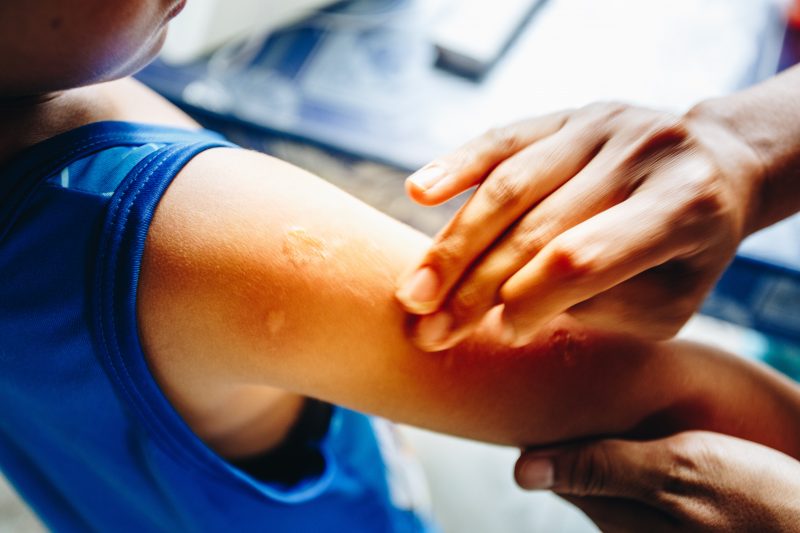
Summer is here, and kids are finally playing outside! This is also the time of year when they get insect bites and stings. Here are some tips from pediatric urgent care physician Carolyn Penrod, MD, to help treat those bites, or better yet, prevent them.
Prevention
“The best way to ‘treat’ an insect bite or sting is to avoid getting it in the first place,” Dr. Penrod said. “The Centers for Disease Control and Prevention recommends using EPA-registered insect repellents that contain at least 20 percent DEET.”
When using insect repellent, be sure to follow the exact instructions on the package.
- If you use sunscreen, apply it first, let it dry and then apply repellent. Do not use products that contain both sunscreen and repellent.
- Do not spray repellent on the skin under clothing.
- Do not use repellents on babies younger than 2 months old. Protect them by draping mosquito netting over their carrier or car seat. Netting should have an elastic edge for a tight fit.
- Apply repellent to your hands, and then gently spread it over your child’s exposed skin. Do not apply repellent to children’s hands because they tend to put their hands in their mouths.
- Keep repellent out of the reach of children.
Other prevention tips include wearing long-sleeved shirts, long pants, socks and a hat. Tuck your shirt into your pants, and tuck your pants into your socks for maximum protection. Wear socks and shoes instead of sandals.
“Avoid areas where insect activity is high such as standing water or the edges of a hiking trail,” Dr. Penrod shared. “Keep your kids inside early in the morning and at dusk when bugs are the worst.”
At-home Treatments
If your child gets an insect bite, some simple home treatments can help provide relief.
- Apply an ice pack to a bite or sting for 15 to 20 minutes once an hour for the first 6 hours. When not using ice, keep a cool, wet cloth on the bite or sting for up to 6 hours. “Always keep a cloth between your child’s skin and the ice pack,” Dr. Penrod recommended. “Do not apply ice for longer than 15 to 20 minutes at a time or allow your child to fall asleep with the ice pack on her skin.”
- Elevate the area of the bite or sting to decrease swelling.
- Try an over-the-counter medicine to relieve itching, redness and swelling. An antihistamine taken by mouth, may help. Check with your doctor first before giving it to your child.
- A spray of local anesthetic containing benzocaine may help relieve pain, but stop using it if your child’s skin reacts to the spray. Hydrocortisone 1 percent cream or calamine lotion applied to the skin may help, but do not use on kids younger than age 2 unless your doctor tells you it’s OK.
- Use acetaminophen or ibuprofen as instructed on the bottle to help with pain.
- After the first 6 hours, if swelling is not present, try applying warmth to the site for comfort.
“To prevent a skin infection, wash the area with clean water twice a day and then wipe the area with first-aid antiseptic,” Dr. Penrod shared. “Trim your child’s fingernails to prevent scratching, which can lead to infection. Do not break any blisters that develop.”
When to Seek Medical Care
Take your child to the nearest hospital emergency department if he has a history of severe bite/sting reactions and experiences symptoms. Seek emergency care if your child doesn’t have a history of severe reactions but experiences these symptoms:
- Wheezing
- Shortness of breath
- Chest pain or tightness
- Sensation of the throat closing or difficulty speaking or swallowing
- Faintness or weakness
- Abdominal pain, vomiting
- Severe swelling around the site (such as your entire arm or leg is swollen)
“You should see a pediatrician or urgent care doctor as soon as possible if your child develops a rash or hives, has moderate swelling or an uncontrollable itch – or if the insect bite looks infected,” Dr. Penrod said. “Signs of infection include increased pain, swelling, redness or warmth around the sting; red streaks leading from the area; pus draining from the sting; or a fever.”
Don’t let the risk of bug bites keep your kids from exploring the outdoors, enjoying fresh air and having an active summer. “Now that you know how to prevent and treat insect bites,” Dr. Penrod said, “get outside and enjoy the summer fun with your family!”
For a list of Akron Children’s urgent care locations, click here.










